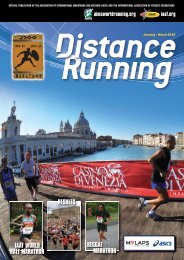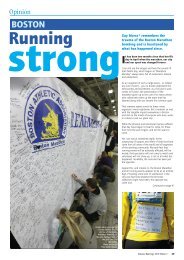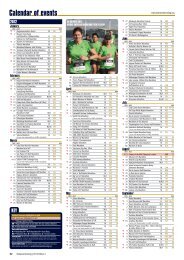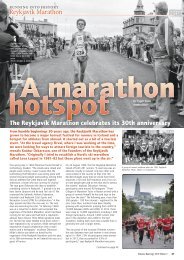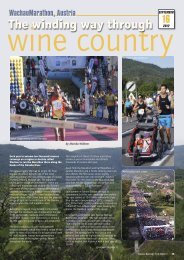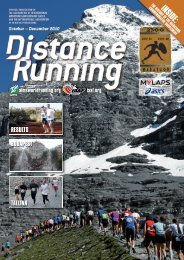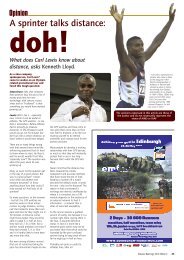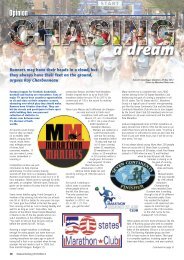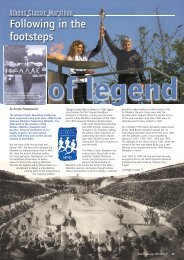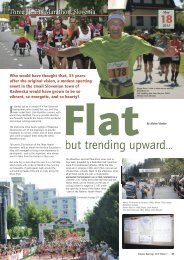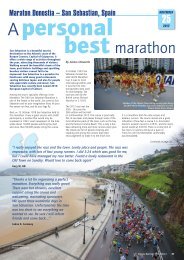Download pdf - Distance Running magazine
Download pdf - Distance Running magazine
Download pdf - Distance Running magazine
You also want an ePaper? Increase the reach of your titles
YUMPU automatically turns print PDFs into web optimized ePapers that Google loves.
Opinion<br />
If the stories coming out of Liberia could change from child soldiers to child athletes,<br />
from blood diamonds to gold medals, then this was worth every inch of effort.<br />
Nothing says ambition, perseverance, resilience and achievement like a marathon<br />
Continued from page 27<br />
count for so much more in Liberia. Aside from<br />
health and exercise, athletics in Liberia barely<br />
registers a pulse. Liberia sent 11 athletes to the<br />
Beijing Olympics, but has never qualified a distance<br />
runner. A successful race could promote running,<br />
inspire youngsters and bring in resources.<br />
Marathons also stoke business, and over a longer<br />
time can drive tourism – much needed visitors for<br />
Liberia’s pristine rainforest and immaculate<br />
beaches.<br />
Above all I know that over time, hosting a credible<br />
international event would change the way people<br />
think about Liberia, both abroad and at home. If<br />
the stories coming out of Liberia could change from<br />
child soldiers to child athletes, from blood<br />
diamonds to gold medals, then this was worth<br />
every inch of effort. Nothing says ambition,<br />
perseverance, resilience and achievement like a<br />
marathon. These are qualities Liberia has in spades,<br />
and it’s time the world knew.<br />
The idea had force. And so to the challenge of<br />
taking the idea to fruition, and to the practical<br />
challenges everyone had been so quick to point<br />
Race winner Gebre Beraki<br />
receiving his trophy from<br />
President Sirleaf<br />
28 <strong>Distance</strong> <strong>Running</strong> | 2011 Edition 4<br />
out. I had run in a few marathons and<br />
shorter races, but had never organised<br />
one before. I needed advice from<br />
people who had. I started my<br />
homework, and the best resource was<br />
AIMS: full of helpful advice.<br />
Early on I worked out that there are<br />
three things you have to get right:<br />
first, find a group of capable and<br />
willing co-conspirators (neither they<br />
nor I would be paid); second, get the<br />
right authorisation and permissions<br />
from the powers-that-be (and there are<br />
a lot of them in Liberia); third, raise<br />
the money. Looking back, if you can do these three<br />
things then no matter how hard the environment<br />
the rest comes down to disciplined organisation. I<br />
made that last bit sound easy – it isn’t, but it is<br />
more or less within your control as a race director.<br />
By early 2011 a team had coalesced around the<br />
project, and I approached the most important<br />
stakeholders, who could make or break us: the<br />
Athletics Federation, the Ministry of Sports and City<br />
Hall. In Liberia you have to go in at the top - unless<br />
the person in charge agrees, nothing will happen. I<br />
Women's marathon<br />
winner - 18 year old<br />
Liberian Lucy Massaquoi<br />
The Mayor of Monrovia after running the entire 10K<br />
had good contacts in the government, but we were<br />
blessed from the start (and to the finish) by the<br />
enthusiastic support of the Sports Minister and the<br />
Mayor. Along with this great official support, the<br />
biggest stroke of luck was finding a title sponsor<br />
who believed the marathon was possible. Unless<br />
BHP Billiton had bought in, and stayed with the<br />
project, it would never have got off the ground.<br />
A marathon in Liberia posed steep challenges.<br />
There was a decrepit and widely corrupt official<br />
system where everyone along the chain demands<br />
what the Liberians call ‘cool water’ for doing their<br />
job. We faced a private sector that was still young<br />
and not accustomed to the ‘sponsorship paradigm’<br />
– ie you give us money and we give you value. We<br />
faced a culture inimical to planning – people can’t<br />
compute an event until it is a couple of weeks<br />
away - impossible for realising a marathon. We<br />
faced disorganised partners who also had no<br />
resources. The Liberian National Police have about<br />
10 cars and 15 traffic cones… for the whole<br />
country.<br />
For any aspiring race directors in a similar<br />
environment I have three words for you:<br />
relationships, relationships, relationships. If you<br />
think about things in terms of relationships you will<br />
nurture your Federation; you will cultivate<br />
relationships with the authorities, Mayor, Minister,<br />
police; you will remember to make your sponsors<br />
Continued on page 31



